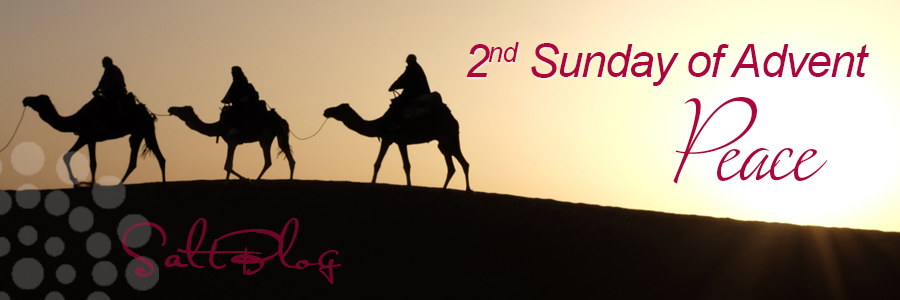Isaiah 11:1-9
“On that day, a shoot shall sprout from the stump of Jesse,
and from his roots a bud shall blossom...
Not by appearance shall he judge,
nor by hearsay shall he decide,
but he shall judge the poor with justice,
and decide aright for the land’s afflicted.
He shall strike the ruthless with the rod of his mouth,
and with the breath of his lips he shall slay the wicked.
Justice shall be the band around his waist,
and faithfulness a belt upon his hips.
Then the wolf shall be a guest of the lamb,
and the leopard shall lie down with the kid;
the calf and the young lion shall browse together,
with a little child to guide them.
The cow and the bear shall be neighbors,
together their young shall rest;
the lion shall eat hay like the ox.
The baby shall play by the cobra’s den,
and the child lay his hand on the adder’s lair.
There shall be no harm or ruin on all my holy mountain;
for the earth shall be filled with knowledge of the LORD,
as water covers the sea.”
I’ve loved singing hymns since I was a child, sitting next to my parents in church, listening to my dad harmonize and to my mom’s beautiful soprano lilt. Eventually, I learned to read the alto line, and would concentrate on being able to follow the often-unintuitive harmonic changes. I didn’t pay very close attention to the words, preferring to admire how the sound of my voice mixed with others to create beautiful noise, instead of pondering the archaic language and outdated turns-of-phrase tumbling out of my mouth.
And, I confess, there are times I read the promises of scripture much like I sang the prose of songs: without much thought as to what they really mean. Or, more specifically, what they mean I am being called to do. “Isaiah 11, yeah, the wolf and the lamb and no more hurting and killing.”
During Advent, many of us will sing the familiar refrain of Oh Come, Oh Come, Emmanuel. Here’s a version I love.
“Oh come, thou Dayspring, come and cheer / us to thine Advent here / disperse the gloomy clouds of night / and death’s dark shadows put to flight.”
Come thou Dayspring.
A “dayspring” is the dawn of a new day, or the beginning of a new era, a new order, a new way of doing business. Far from just another sunrise on just another day, the particular dayspring of Jesus’ birth would mark a profound shift in what it meant to be alive on this earth. This Dayspring would bridge social, economic, gender, religious, health, legal, and all other divides. This Dayspring would bring hope to a people suffering under the tyrannical rule of a violent empire and to those within the empire, too. This Dayspring would turn notions of forgiveness, hospitality, and faithfulness on their heads. This Dayspring would conquer death, and show us that we can, too.
From Isaiah’s prophecy (“There shall be no harm or ruin on all my holy mountain”) to Mary’s Magnificat (“[H]e has brought down the mighty from their thrones and exalted those of humble estate”) to an 18th-century German hymnal (“death’s dark shadows put to flight”), we see that the incarnation, the enfleshing, of God signals a profound change in the same old death-dealing order of things.
And yet, I find myself thinking in ways and taking actions that give death victory. “I’m just one person, my actions won’t make a difference.” “There are so many things going wrong, I can’t think about them all.” “This is just one of the compromises I’m making to this imperfect world.” These are not the thoughts that fuel the dogged pursuit of peace, they are complacency and surrender to the lies of the Enemy.
How can we pursue peace? What choices can we make that help foster the flourishing of God’s whole creation? How can we contribute to life, and not death, to healing, and not violence? How can we love, and not fear?
A prayer, because we won’t be able to do this alone:
God for whom we wait,
Lord of night and the solemn beauty of darkness:
you have grieved over your creation,
over our swords and all the terrible weapons we fashion.
Nations and peoples live in fear: how can we make tools of our swords
or take the wages of our weapons to feed the hungry?
Give us, Lord, a love that is greater than our fear.
We wait for the Messiah,
keeping watch and praying in his name,
Jesus, who is Lord for ever and ever. Amen.
– Catholic Household Blessings and Prayers, 1988
About the Author
Sarah is the author of Vegangelical: How Caring for Animals Can Shape Your Faith (Zondervan, 2016) and Animals Are Not Ours (No, Really, They’re Not): An Evangelical Animal Liberation Theology (Cascade Books, 2016). She spends her days working for CreatureKind, helping Christians put their faith into action. She lives in Eugene with her husband, son, and animal companions and enjoys action movies, black coffee, the daily crossword, and dreaming of her next international journey.


